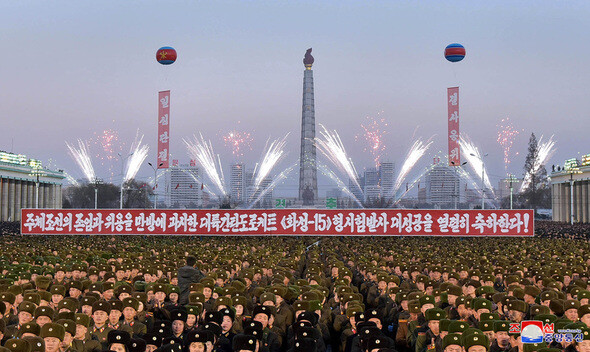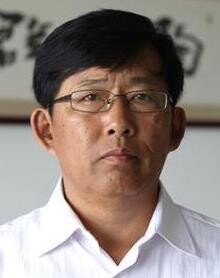hankyoreh
Links to other country sites 다른 나라 사이트 링크
[Column] How long can North Korea withstand international pressure?

When I visited North Korea at the end of this past May, my biggest question was how long the North can withstand sanctions by the international community. But this question was rendered moot by the mysteriously positive changes on display in the North. The country was filled with so much energy that I found myself doubting whether it was really under “unprecedented sanctions.” Scholars have been saying that the North Korean economy is booming, and the significance of such remarks was evident everywhere.
At the beginning of last month, I went to North Korea once again. It was early winter, but the weather in Pyongyang seemed unusually cold, as if to reflect the harsh sanctions. This reminded me once again of the question of how long the North could endure sanctions of such unparalleled harshness. After North Korea carried out its sixth nuclear test on Sept. 3, the international community’s sanctions have put the North under harsh pressure.
During my visit, I happened to get the chance to observe a gathering of 5,000 social scientists from around the country for North Korea’s third social science convention, which was held for the first time in 45 years. As I listened to the thunderous applause and cheering and the passionate shouting of slogans, I found myself thinking that more pressure and sanctions would only reinforce the solidarity of the regime and exacerbate animosity toward the international community.
But what I found even more mysterious was that the convention lasted for a day and a half with hardly any mention of the words “nuclear,” “missile” or “sanctions” in the remarks made by a newly elected member of the Political Bureau of the Korean Workers’ Party (KWP) and Vice Chairman of the party. The word “sanctions” barely came up during conversations with North Korean scholars about the North Korean economy. Why could that be? Despite the brash assurance in the outside world that North Korea cannot hold on much longer and will soon collapse, North Koreans seem to be accepting that situation with remarkable equanimity.
I bluntly asked North Korean experts how long they could endure the international community’s tough new sanctions. In response, they pointed out that they had always been under sanctions. Over the course of decades of sanctions, they had learned how to cope with them. They argued that they were not under sanctions because they were developing nuclear weapons, but that they were developing nuclear weapons because the US was threatening their security with sanctions. That was enough to elevate Kim Jong-un into a “legendary hero” who was boldly fighting the US, the strongest country in the world, with nuclear weapons and missiles. Ultimately, it was possible to conclude that the tougher sanctions had imparted legitimacy to Kim Jong-un’s rule and had endowed Kim with accomplishments comparable to those of his grandfather and father, Kim Il-sung and Kim Jong-il.
Aside from the fact that the weather was unusually cold for the early winter, not much in Pyongyang had changed since the end of May. During the first five years of the Kim Jong-un regime, sanctions had cut the supply of crude oil in half. This had doubled the price of gasoline, which was now selling for about 10 renminbi (US$1.51) per liter. But the price of buses and taxis running on gasoline had not risen at all. The price of rice remained stable as well. There were still no indications that the economy was tottering. Even North Korean scholars find this a mystery.
Since the North Koreans are not superhumans, they will surely be affected by tough sanctions in the long run. The problem, however, is that the North has long been taking measures to prepare for sanctions. In case the supply of crude oil is completely cut off, the North has been focusing on extracting crude oil from coal and from its own oil wells. In order to conserve heavy oil, it has developed an oil-free ignition method at its coal-fired power plants.
North Korea has also diverted large amounts of the coal it is blocked from exporting to the energy industry and is increasing the share of coal-burning plants in the energy mix. It is transferring advanced technology in its arms industry to light industry and greatly increasing the share of light industrial products made domestically. North Korean leaders assert that they will fundamentally redress the energy shortage and completely resolve the food supply by 2020.

How long can North Korea hold on through such methods? If the leadership continues to expend its funds with tough sanctions blocking an infusion of new energy, there is little chance that its economy will grow. But the unruffled expressions on the faces of the North Koreans clearly suggest that they have the strength to keep enduring.
The day before I left, there was a heavy snowfall in Pyongyang. It was a sign that another cold spell was on its way. But that day, at least, was unseasonably warm.
By Jin Jingyi, professor in the Foreign Language Center of Peking University
Please direct questions or comments to [english@hani.co.kr]

Editorial・opinion
![[Column] Has Korea, too, crossed the Rubicon on China? [Column] Has Korea, too, crossed the Rubicon on China?](https://flexible.img.hani.co.kr/flexible/normal/500/300/imgdb/original/2024/0419/9317135153409185.jpg) [Column] Has Korea, too, crossed the Rubicon on China?
[Column] Has Korea, too, crossed the Rubicon on China?![[Correspondent’s column] In Japan’s alliance with US, echoes of its past alliances with UK [Correspondent’s column] In Japan’s alliance with US, echoes of its past alliances with UK](https://flexible.img.hani.co.kr/flexible/normal/500/300/imgdb/original/2024/0419/2317135166563519.jpg) [Correspondent’s column] In Japan’s alliance with US, echoes of its past alliances with UK
[Correspondent’s column] In Japan’s alliance with US, echoes of its past alliances with UK- [Editorial] Does Yoon think the Korean public is wrong?
- [Editorial] As it bolsters its alliance with US, Japan must be accountable for past
- [Guest essay] Amending the Constitution is Yoon’s key to leaving office in public’s good graces
- [Editorial] 10 years on, lessons of Sewol tragedy must never be forgotten
- [Column] A death blow to Korea’s prosecutor politics
- [Correspondent’s column] The US and the end of Japanese pacifism
- [Guest essay] How Korea turned its trainee doctors into monsters
- [Guest essay] As someone who helped forge Seoul-Moscow ties, their status today troubles me
Most viewed articles
- 1[Column] The clock is ticking for Korea’s first lady
- 2Samsung barricades office as unionized workers strike for better conditions
- 3After 2 months of delayed, denied medical care, Koreans worry worst may be yet to come
- 4[Column] Has Korea, too, crossed the Rubicon on China?
- 5All eyes on Xiaomi after it pulls off EV that Apple couldn’t
- 6[Correspondent’s column] In Japan’s alliance with US, echoes of its past alliances with UK
- 7US overtakes China as Korea’s top export market, prompting trade sanction jitters
- 8Hong Se-hwa, voice for tolerance whose memoir of exile touched a chord, dies at 76
- 9[Editorial] When the choice is kids or career, Korea will never overcome birth rate woes
- 10[Photo] Smile ambassador, you’re on camera